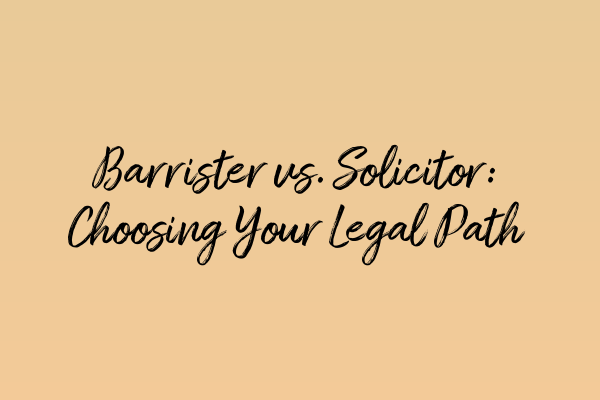Barrister vs. Solicitor: Choosing Your Legal Path
Are you considering a career in the legal profession? Do you find yourself confused about the difference between a barrister and a solicitor? If so, you’ve come to the right place. In this blog post, we will explore the distinctions between these two legal roles and help you make an informed decision about which path to choose.
Barristers and solicitors are both legal professionals, but they have different roles, responsibilities, and areas of expertise. Understanding these distinctions is key to determining which path aligns with your interests and aspirations.
Let’s start with barristers. Barristers specialize in advocacy and courtroom representation. They are often referred to as “counsel” and are renowned for their excellent oral advocacy skills. If you have a passion for public speaking, enjoy intellectual challenges, and thrive in a high-pressure environment, becoming a barrister might be the right path for you.
As a barrister, you will typically work in chambers, which are shared offices with other barristers. You will be self-employed and have the opportunity to take on a variety of legal cases. Barristers are commonly instructed by solicitors or directly by clients to provide specialist advice and advocacy in court. They handle cases across a range of legal areas, including criminal law, family law, commercial law, and more.
However, it’s worth noting that to become a barrister, you must complete the Bar Professional Training Course (BPTC) and then secure pupillage. Pupillage is essentially an apprenticeship where you gain practical experience under the supervision of an experienced barrister. It can be highly competitive to secure pupillage, so dedication and perseverance are crucial.
On the other hand, solicitors have a broader scope of practice. They provide legal advice, handle paperwork, negotiate settlements, and represent clients in various legal matters. Solicitors work closely with clients and are often the first point of contact for legal assistance. If you enjoy building relationships, providing comprehensive legal advice, and working across multiple legal areas, becoming a solicitor may be the right fit for you.
To become a solicitor in England and Wales, you must complete the Legal Practice Course (LPC) after obtaining a qualifying law degree. Following the completion of the LPC, you will embark on a two-year training contract with a law firm or organization. This practical training period allows you to gain hands-on experience and develop your skills. Once you complete your training contract, you can apply to be admitted as a solicitor.
It’s important to note that solicitors can also specialize in various practice areas, such as criminal law, corporate law, family law, and more. The areas of specialization within the solicitor’s role are vast, providing a wide range of career opportunities.
Choosing between a barrister or solicitor ultimately depends on your interests, strengths, and career goals. Barristers tend to focus on courtroom advocacy and specialize in specific areas of law. Solicitors, on the other hand, have a broader scope of practice and work closely with clients to provide comprehensive legal advice.
If you’re interested in criminal law, take a look at our related article on SQE Prep: Tips and Tricks to Excel in Criminal Law. Criminal law is a fascinating area of practice with its own unique challenges and rewards. Our article will provide you with valuable insights and strategies to succeed in this field.
For those interested in the art of questioning and cross-examination, our article on Cross-Examination Techniques: Mastering the Art of Questioning is a must-read. It delves into the techniques and strategies employed by legal professionals to effectively examine witnesses in court.
Private prosecutions are an increasingly important aspect of the legal system. If you’re curious about non-governmental prosecutions in criminal cases, our article on Private Prosecutions: Exploring Non-Governmental Prosecutions in Criminal Cases is a comprehensive resource.
Ethical challenges are ever-present in the legal profession, especially in criminal defense. Navigating these dilemmas requires careful consideration and adherence to professional ethics. Our article on Ethical Challenges in Criminal Defence: Navigating Dilemmas will help you gain a deeper understanding of these challenges and how to approach them.
Lastly, if you want to explore assault and battery laws and understand the legal parameters surrounding them, our article on Assault and Battery Laws: Understanding the Legal Parameters is a valuable resource. It examines the legal framework and provides insights into handling cases related to assault and battery.
In conclusion, choosing between a barrister and solicitor is a personal decision that depends on your interests, skills, and career aspirations. Both roles have unique strengths and offer rewarding careers in the legal profession. We hope this article has shed light on the differences between barristers and solicitors, helping you make an informed decision about your legal path. Remember, there is no right or wrong choice—just the one that aligns best with your passion and goals.


Leave a Reply